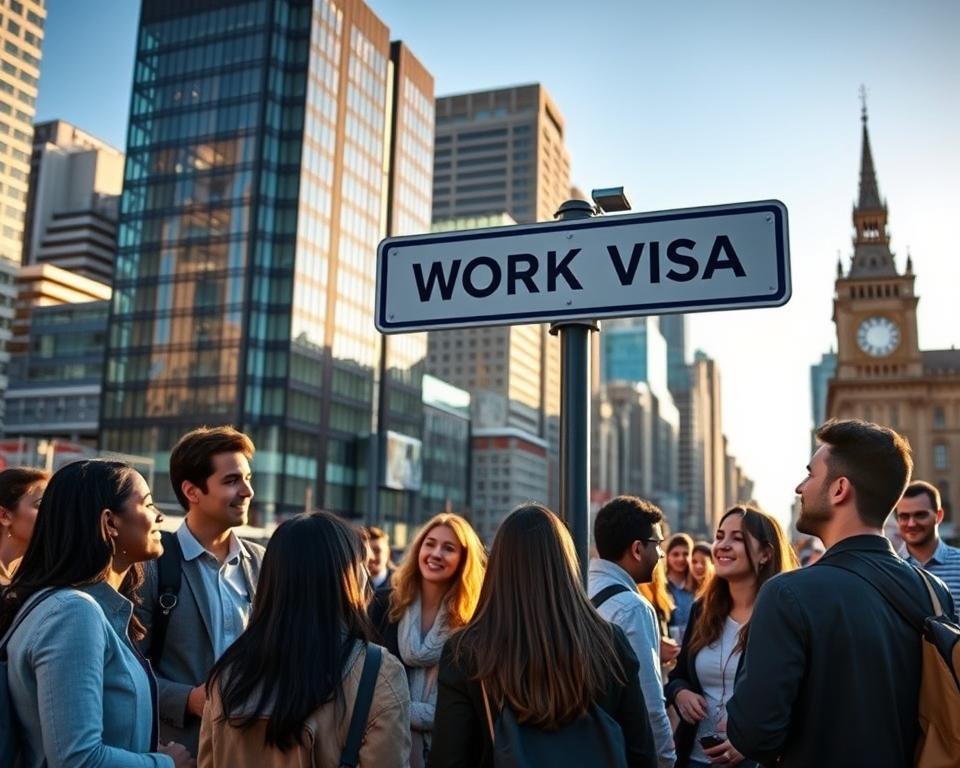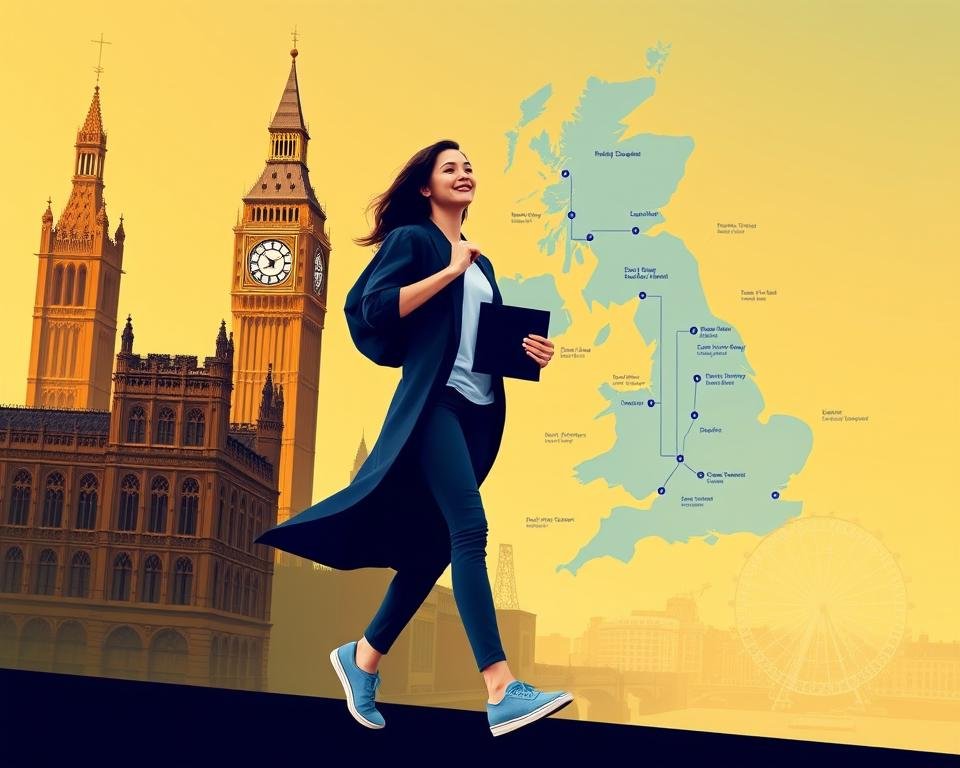Navigating the UK Post-Study Work Visa Process

Imagine a group of excited international students, just after their graduation at a top UK university. Their time studying in the UK has been unforgettable. Now, they must decide: go back home or stay in the UK to work?
They learn about the UK post-study work visa, known as the graduate route. This route lets them stay and grow their careers. It's a big chance for them.
This article will help you understand the UK immigration process for the graduate route. We'll cover who can apply, how to apply, and the job opportunities available. Knowing this visa well is key for those wanting to thrive in the UK. For more details, check out this useful resource.
- Introduction to the UK Post-Study Work Visa
- What is the Graduate Route?
- Eligibility Criteria for the UK Post-Study Work Visa (Graduate Route)
- Application Process for the Graduate Route
- UK Visa Requirements for International Students
- Post-Study Work Rights in the UK
- Working Opportunities After Study in the UK
- Common Challenges in the UK Visa Process
- Support and Resources for Applicants
Introduction to the UK Post-Study Work Visa
The UK post-study work visa is a big chance for international students finishing their studies in the UK. It lets graduates work for up to two years, or three years for those with doctoral degrees. They don't need a separate work permit.
This move is key to the UK's plan to draw in skilled people from everywhere. It gives international students a chance to get vital work experience. This boosts their job chances in the UK and helps the economy.
Graduates can find jobs that fit their skills. This helps them build professional networks. These networks are good for their future careers.

What is the Graduate Route?
The Graduate Route started on 1 July 2021. It's a big deal for international students in the UK. It lets graduates stay in the UK for a while after they finish their studies.
Graduates can live and work in the UK for up to two years after their degree. Those with a doctoral degree can stay for three years. This makes it easier for them to start their careers.
This route is open to many. Graduates with a valid Tier 4 visa can join without a limit. This is great for students looking to find jobs in the UK.
The UK wants to keep talented people who studied here. Graduates can find jobs that match their skills. This helps them fit into the UK's workforce well.
The graduate route is more than just a visa. It shows the UK's commitment to helping international students succeed in their careers.

Eligibility Criteria for the UK Post-Study Work Visa (Graduate Route)
Understanding the eligibility criteria for the UK post-study work visa is key for international students. They need to know what it takes to extend their stay after graduation. The Graduate Route has specific requirements to ensure applicants meet its goals.
First, candidates must have finished an eligible course at a UK higher education provider. This provider must follow the UK’s immigration rules. The course should lead to a degree or a postgraduate qualification recognised in the UK.
Applicants must have a valid tier 4 visa when they apply. This shows the importance of staying legal during their studies. They also need to apply from within the UK, which means they must be living there.
It's vital to show that you've successfully finished your qualification. You'll need official confirmation from your school to prove this. Meeting these criteria greatly increases your chances of getting the Graduate Route visa.
| Eligibility Criteria | Description |
|---|---|
| Course Completion | Must complete an eligible undergraduate or postgraduate course in the UK. |
| UK Higher Education Provider | Study at an institution with a proven record of compliance with immigration laws. |
| Current Visa Status | Must hold a valid tier 4 visa during the application process. |
| Application Location | Applications must be made from within the UK. |
| Formal Confirmation | Submission of official confirmation from the educational institution is required. |

Application Process for the Graduate Route
Applying for the UK post-study work visa is a key step for international students. It lets them stay in the UK after finishing their studies. The process involves an online application and several important documents to show you're eligible.
Step-by-Step Guide to Applying Online
To start, visit the UK government’s official website to apply online. Here's a simple guide:
- Create an account on the official UK visa application site.
- Fill out the online application form, detailing your current immigration status and educational background.
- Once the application is completed, submit it along with the necessary fee.
- Pay the immigration health surcharge to cover healthcare during your stay.
Documents Required for Application
When applying, it's important to have the right documents ready. You'll need:
- A valid passport or travel document.
- Evidence of successful completion of studies in the UK.
- A confirmation from the educational institution, often in the form of a confirmation letter.
- Biometric information, which may need to be uploaded after the online application.
- Proof of English language proficiency if applicable.
Having these documents ready will make the application process easier. It helps ensure a successful application for the UK post-study work visa.
UK Visa Requirements for International Students
For international students wanting to study in the UK, knowing the visa rules is key. The first step is getting a UK student visa, known as the tier 4 student visa. You need to show you've been accepted by a recognised school and have the right qualifications for your course.
Students also have to prove they can afford to live in the UK. This means showing you have enough money for tuition and living costs. Knowing English well is also important. You'll need to pass a standardised English test to show your language skills.
After finishing your studies, you can apply for the Graduate Route. This lets you stay in the UK for up to two years. It's important to follow the immigration rules while you're there. Breaking these rules could affect your chances of getting a post-study work visa.
| Requirement | Description |
|---|---|
| Acceptance from Institution | Proof of enrolment in a recognised UK educational institution. |
| Financial Support | Evidence of adequate funds to cover tuition and living costs. |
| English Language Proficiency | Demonstration of required English language skills through approved tests. |
| Compliance with Immigration Rules | Adherence to all immigration regulations throughout their studies. |
Post-Study Work Rights in the UK
International students get great post-study work rights in the UK under the Graduate Route. They can work in any field they choose. This lets them explore different career paths.
Working in various sectors helps graduates gain valuable experience. It also boosts the UK economy. By finding work, they can improve their skills and meet industry demands.
International graduates can also switch to other visa categories, like skilled worker visas. This opens up more career opportunities. Knowing about these rights helps graduates make the most of their UK degree.
Working Opportunities After Study in the UK
Graduates in the UK have many job opportunities. The country's job market is lively and diverse. This means you can find work in many sectors, each with its own career paths. It's important to know about these sectors and how to network to get the job you want.
Sector-Specific Job Opportunities
Many industries in the UK are booming, giving graduates lots of job choices. Some of the top sectors include:
- Technology: With new tech coming out all the time, jobs in IT, software, and data analysis are plentiful.
- Health Care: Jobs in medicine, research, and support are key in this sector, more so after recent health issues.
- Education: There's a big need for teachers and support staff, with a focus on STEM subjects.
- Finance: The UK's finance sector offers many roles in banking, accounting, and investment.
- Engineering: There are jobs in mechanical, civil, and electrical engineering to meet the UK's building needs.
Networking and Resources for Job Seekers
Networking is key to finding jobs that aren't advertised. Here are some tips:
- Use LinkedIn to meet industry people and companies.
- Go to career fairs to talk to employers directly.
- Join professional associations related to your field for tips and chances.
Universities also offer lots of help for job seekers. They provide:
- Career services for personal advice and guidance.
- Workshops on making CVs and preparing for interviews.
- Access to job boards with openings in different sectors.
Common Challenges in the UK Visa Process
The UK visa process can be tough for international students. It's full of complex application rules, which change based on the visa type. If you don't understand what you need, it can cause delays and problems. So, it's key to know exactly what you're applying for.
Waiting for a visa can be stressful. Students might wait for weeks or months, which can mess up their study and job plans. The cost of visa fees and health charges can also be a big worry, making it hard to budget.
Getting all the right documents can feel like a big task. Students might find it hard to get things like proof of money or past school records. Getting help from university advisors or immigration experts can make things easier. For more tips on dealing with visa problems, check out this resource.
| Challenge | Description |
|---|---|
| Complex Application Requirements | Difficulty understanding the specific documents and information needed for the application. |
| Lengthy Processing Times | Extended waiting periods for visa decisions affecting personal schedules. |
| Eligibility Misunderstandings | Confusion about meeting the necessary criteria for visa applications. |
| Financial Constraints | Struggles in covering visa fees, health surcharges, and living expenses. |
| Document Gathering | Challenges faced while collecting essential paperwork for the application. |
Support and Resources for Applicants
Applying for a UK post-study work visa can be challenging. But, there's plenty of help available. Universities in the UK have teams dedicated to supporting international students. They guide you through visa applications and legal needs.
Online platforms are also great resources. They offer detailed info on immigration policies and application steps. These sites help make the process clearer, making it easier to prepare your documents.
Joining peer support groups can also be very helpful. These groups share experiences and advice from those who've gone through the visa process. It's a way to get practical tips and emotional support, helping you make informed decisions.
If you want to know other articles similar to Navigating the UK Post-Study Work Visa Process You can visit the category Migration.

Leave a Reply